
Karl Johann Greith (b. at Rapperswil, Switzerland, 25 May 1807; d. at St. Gallen, 17 May 1882) was a Swiss Catholic bishop and church historian.

Karl Johann Greith (b. at Rapperswil, Switzerland, 25 May 1807; d. at St. Gallen, 17 May 1882) was a Swiss Catholic bishop and church historian.
He received his early education at St. Gall, then went to the lyceum at Lucerne and the University of Munich; at the university he studied theology, philosophy, and history, and met Joseph Görres. In 1829 he went to Paris to perfect himself in library work; while there he decided to enter the priesthood and completed his theological studies in the Sulpician seminary of that city. He was ordained priest in 1831, and was made sub-librarian of St. Gall, also sub-regent and professor of the ecclesiastical seminary.
During the ecclesiastico-political troubles which soon after arose in Switzerland, Greith was prominent with pen and voice in defence of the Catholic Church. He was, consequently, deprived of his offices. He went to Rome, at the instance of the English Government, for the purpose of collecting documents in the Roman libraries and archives relating to English history. After the restoration of peace he devoted himself to parochial work in St. Gall, was made dean of the cathedral in 1847, professor of philosophy in 1853, and was consecrated Bishop of St. Gall in 1862.
From early years he had been an intimate friend of Ignaz von Döllinger, and at the First Vatican Council he held, in regard to the question of papal infallibility, that a dogmatic decision was inadvisable under existing circumstances. However, he accepted the decision of the council and tried to induce Döllinger to do the same.
Greith was a strong champion of ecclesiastical interests and defended the Catholic church against civil power. He could not prevent the suppression of his seminary for boys nor hinder the civil prohibition of missions and retreats; nevertheless he renewed the religious life of his diocese and called into being an educated clergy.
He devoted himself to the study of history and corresponded with numerous scholars, among others Joseph Freiherr von Lasaberg, Georg Heinrich Pertz, Johann Friedrich Böhmer, Franz Pfeiffer, Johann Friedrich Heinrich Schlosser, Franz Mone, Gall Morel, and others. His numerous ecclesiastico-political writings were only of transient importance, and they bear witness to his Catholic sentiments.
In his sermons and pastoral letters he laid great stress on the greatness and majesty of God as exhibited in the Redemption and in the founding and continuous activity of the Catholic Church. He published Katholische Apologetik in Kanzelreden in three volumes (Schaffhausen, 1847–52). He also wrote, in collaboration with the Benedictine Georg Ulber, Handbuch der Philosophie fur die Schule und das Leben (Freiburg, 1853–57).
Greith had no sympathy with scholastic philosophy and esteemed Descartes and Leibnitz.
His best and most lasting work was done in history. Among his historical publications were:
This last work is an exhaustive study of the foreign relations of the early Roman Catholic Church in Ireland, especially its relations with Rome and its missionary work.
Johann Karl Ludwig Gieseler, KH was a Protestant German church historian.

Johann Joseph Ignaz von Döllinger, also Doellinger in English, was a German theologian, Catholic priest and church historian who rejected the dogma of papal infallibility. Among his writings which proved controversial, his criticism of the papacy antagonized ultramontanes, yet his reverence for tradition annoyed the liberals.

The Diocese of Mainz, historically known in English as Mentz as well as by its French name Mayence, is a Latin Church ecclesiastical territory or diocese of the Catholic Church in Germany. It was founded in 304, promoted in 780 to Metropolitan Archbishopric of Mainz and demoted back in 1802 to bishopric. The diocese is suffragan diocese in the ecclesiastical province of the metropolitan Archdiocese of Freiburg. Its district is located in the states of Rhineland-Palatinate and Hesse. The seat of the diocese is in Mainz at the Cathedral dedicated to Saints Martin and Stephen.

Joseph Hergenröther was a German Church historian and canonist, and the first Cardinal-Prefect of the Vatican Archive.
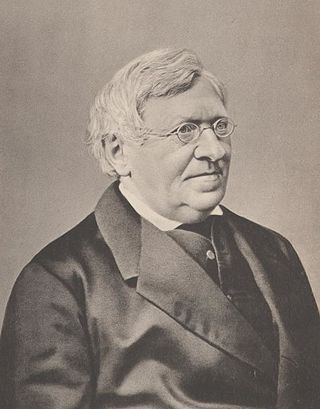
Johann Baptist Alzog was a German theologian and Catholic church historian.
The von Hurter family belonged to the Swiss nobility; in the eighteenth and nineteenth centuries three of them were known for their conversions to Roman Catholicism, their ecclesiastical careers in Austria and their theological writings.

Johann Michael Raich was a Catholic theologian.
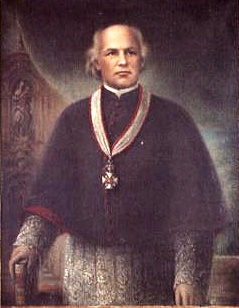
Franz Christoph Ignaz Moufang was a German Catholic theologian and diocesan administrator.
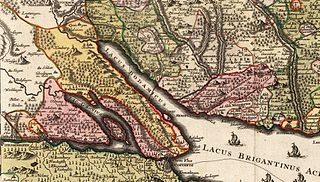
The Prince-Bishopric of Constance was a small ecclesiastical principality of the Holy Roman Empire from the mid-12th century until its secularisation in 1802–1803. In his dual capacity as prince and as bishop, the prince-bishop also governed the Diocese of Konstanz, which existed from about 585 until its dissolution in 1821, and whose territory extended over an area much larger than the principality. It belonged to the ecclesiastical province of Mainz since 780/782.

Franz Xaver Dieringer was a Catholic theologian. He was a professor of dogma and homiletics at the University of Bonn.
The Collegium Germanicum et Hungaricum, or simply Collegium Germanicum, is a German-speaking seminary for Catholic priests in Rome, founded in 1552. Since 1580 its full name has been Pontificium Collegium Germanicum et Hungaricum de Urbe. It is located on the Via di San Nicola da Tolentino.
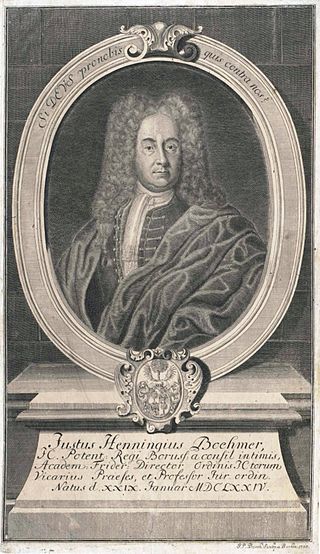
Justus Henning Böhmer was an outstanding German jurist, ecclesiastical jurist, Professor of the University of Halle and also Geheimer Rat, count palatine and chancellor of the Duchy of Magdeburg.
Franz Xaver Kraus was a German Catholic priest, and ecclesiastical and art historian.

John Joseph Frederick Otto Zardetti was a Swiss prelate of the Roman Catholic Church. He first served as the first bishop of the new Diocese of Saint Cloud in Minnesota in the United States from 1889 to 1894. Zardetti then served as Archbishop of the Archdiocese of Bucharest in what is today Romania from 1894 to 1895. After resigning as archbishop, Zardetti briefly, but influentially served in the Roman Curia with the title of titular archbishop of Mocissus.

Johann Baptist von Hirscher was a German Catholic theologian associated with the Catholic Tübingen school. He exerted a great influence in the areas of moral theology, homiletics, and catechetics.
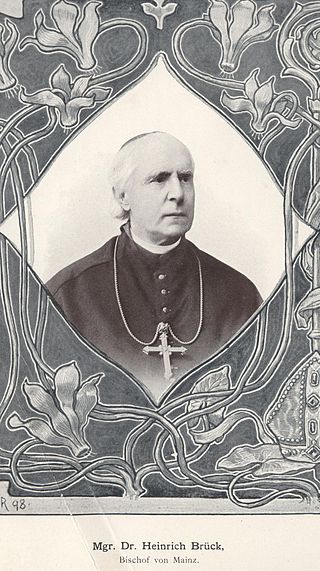
Heinrich Brück was a German Catholic church historian, and Bishop of Mainz.

Johann Friedrich Heinrich Schlosser was a German jurist, writer and translator.
Johann Nepomuk Paul Oischinger was a German Roman Catholic theologian and philosopher who was a native of Witzmannsberg, Bavaria.

The Liebenau monastery was a Dominican monastery. It was located outside the city gates of Worms in today's Worms-Hochheim district.
Christian Johann Christoph Schreiber was a German theologian, philologist, philosopher, and poet. He was also the Superintendent of the dioceses of Lengsfeld and Dermbach. He was connected in friendship or correspondence to writers and philosophers of his time, and published poetry, sermons, historical and philosophical works.